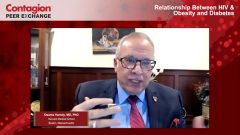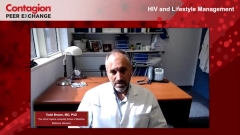
Single-Tablet Combination Therapy for HIV
The significance of treating HIV with single-tablet darunavir/cobicistat/emtricitabine/tenofovir alafenamide based on data demonstrated by the EMERALD and AMBER clinical trials.
Episodes in this series

Grace McComsey, MD, FIDSA: You mentioned the old protease inhibitors [PIs] and weight gain. Obviously, that’s a big problem that we’re facing now. Any conference you go to, there are sessions about weight gain. John, I want to bring you back to discuss a newer protease inhibitor. Now we have a recently approved once a day single tablet with darunavir, cobicistat, and FTC/TAF [emtricitabine and tenofovir alafenamide]. Tell us about the EMERALD study and the AMBER trial, and where does this combination fit within the other regimens we have now, which are mostly integrase inhibitor based?
John Koethe, MD: That’s a good question. To a certain extent it’s refreshing to see that we’re trying out some of the old drug classes again. If you look at the current guidelines or recommendations for the initiation of antiretroviral therapy [ART], in adults and adolescents everything is heavily integrase inhibitor based. All 4 of the lead regimens, 3 of them are 3-drug and 1 is a 2-drug regimen, all have lead compounds that are integrase inhibitor class medications. But for many years, we managed the HIV [human immunodeficiency virus] epidemic with both NNRTIs [nonnucleoside reverse transcriptase inhibitors] and then also with protease inhibitors, and one of the latest generation protease inhibitors with the highest barrier to resistance was darunavir, which is now reappearing in a single-tablet regimen in combination with a cobicistat booster and then in combination with tenofovir alafenamide and emtricitabine. And that’s a good combination as we move away from TDF, tenofovir disoproxil [fumarate], and then also gets away from some of the pretreatment testing requirements that we would see with abacavir and HLA-B-5701. This is a combination pill which is currently in the ART-naïve start guidelines under individuals who are thought to have acute or early HIV infection, and one of the reasons why it’s valuable there in individuals where you need to do a rapid start and you don’t have time for hepatitis B testing, which is one of the main contraindications to the combination of dolutegravir and lamivudine 2-drug therapy.
You don’t have time for HLA-B-5701 testing and you don’t have time for obtaining a genotype and you need to get somebody started, either because you think they are acutely infected with HIV or, in some cases, because you think that this is your one chance to engage them in care. It falls into the same category as some of the integrase regimens where you can simply go ahead and start it and make changes later if you need to. But this is a single-tablet regimen, once a day, so it has the ease and convenience of some of the other Biktarvy [bictegravir, emtricitabine, and tenofovir alafenamide] or Triumeq [abacavir, dolutegravir, and lamivudine] or other single-pill regimens, and it’s been tested in 2 trials, EMERALD and AMBER. The AMBER trial was the first to look at the use of this combination pill in ART-naïve people, and in AMBER, it was a phase III noninferiority trial that randomized ART-naïve individuals to the single-tablet regimen of boosted darunavir, TAF, and FTC, as compared to the same cobicistat-boosted darunavir but in combination with TDF and FTC, an NRTI [nucleoside reverse transcriptase inhibitor] backbone that we’re trying to get away from these days, and that was given in 2 separate tablets. And it basically found that this single-tablet regimen was noninferior in AMBER and found that it had the same degree of viral suppression. And, it was slightly higher, that 91% of the individuals at 48 weeks who were on the combination cobicistat-boosted darunavir with TAF in a single pill achieved viral suppression as compared to only 88% in the arm of boosted darunavir with TDF. And additionally, this was then followed out in the single-tablet arm out to 96 weeks and again showed continued good viral suppression. That was the first indication that this was noninferior to a standard boosted PI regimen. The second trial was EMERALD, which randomized individuals who were already on a boosted PI, many of them already on darunavir in combination with TDF or FTC and switched them to the single-pill regimen to determine whether there was equivalent maintenance of virologic suppression.
And again, the single-tablet regimen met the noninferiority criteria of that study, and, viral rebound only occurred in 2.5% of those on the single tablet as compared to 2.1% of those on the legacy or the prior boosted PI regimen, which was a nonstatistically significant difference between the 2 arms. Right now, when we look at this regimen, it’s shown very good viral suppression rates. We know it has a durable barrier to resistance, and again, it’s a rapid start agent. Also, it gets away from TDF and some of the bone and renal concerns that we may have otherwise seen with those agents. And I should mention that in AMBER and in EMERALD, the bone and renal health indicators were better for that arm, most likely because they were either coming off TDF and going on to TAF or because they were being started on TAF as opposed to the TDF. We see an avoidance of that in a single-pill regimen with a high barrier to resistance, so the question is, are we going to continue to see kind of this emerging as an alternative to our shift to INSTIs [integrase strand transfer inhibitors]? And then where do some of these newer compounds fit in?
Thank you for watching this ContagionLive® Peer Exchange. If you enjoyed the content, please subscribe to the e-newsletter so you can receive upcoming Peer Exchanges and other great content. Thank you for listening.
Transcript Edited for Clarity
Newsletter
Stay ahead of emerging infectious disease threats with expert insights and breaking research. Subscribe now to get updates delivered straight to your inbox.



















































































































































